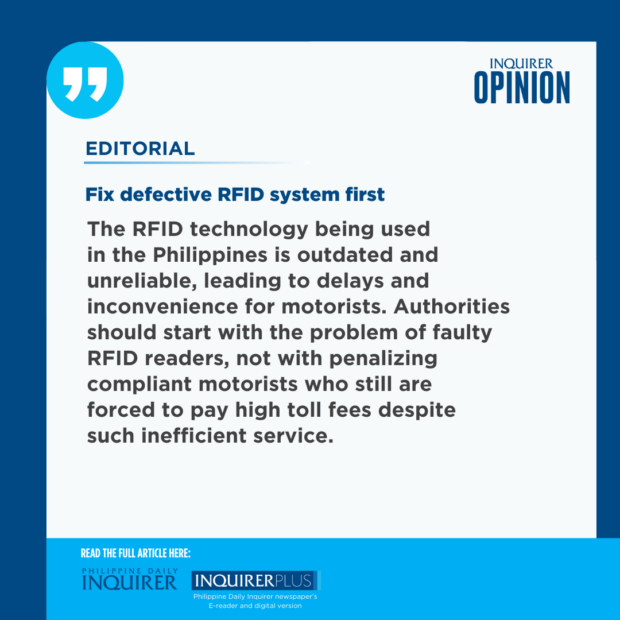Fix defective RFID system first

At the end of this month, motorists using vital toll roads without a valid radio frequency identification (RFID) device or with an insufficient load balance will be fined. The penalties, under Joint Memorandum Circular No. 2024-001 signed last Aug. 1 by the Department of Transportation (DOTr), Land Transportation Office (LTO), and Toll Regulatory Board (TRB), range from P500 for the first offense to P5,000 for the third and subsequent infractions.
Motorists found using fake, tampered, or counterfeit RFID devices and e-cards will also incur penalties. This measure, according to the TRB, “intends to achieve a smoother and faster flow of traffic at the toll plazas, thereby saving time, money, and resources.”
It claimed that these erring motorists with RFID-related violations account for 9 percent of all the motorists using the toll expressways, “causing the unnecessary delays and long queues at the toll plazas.”
While true to some extent, the TRB, DOTr, and LTO are all missing what is actually happening on the ground. The problematic RFID readers are causing the bottlenecks at the toll plaza because most of the 91 percent of users who, as the TRB referred to as “compliant and responsible” and “are often greatly inconvenienced,” have to stop at the booths to have their e-cards scanned manually.
Logjam of vehicles
Last week, Sen. Grace Poe, former chair of the Senate public services committee and now head of the finance panel, suggested that the RFID system first undergo a test of reliability before the government imposes a fine on motorists without RFID or with insufficient load.
She cited complaints by motorists about devices that cannot read RFID stickers, noting that she personally experienced a similar incident. “Some devices also do not reflect the remaining balance or are not functioning at all, that will require the card for manual payment,” the lawmaker said.
Poe said issues that cause “logjam of vehicles at the expressway toll booths manifests the unreliability of the system,” urging regulators and private entities to fix RFID issues and prove that cashless payment will pave the way for a better travel experience.
San Miguel Corp. operates the South Luzon Expressway (SLEx) and the Southern Tagalog Arterial Road (STAR) tollway. Tycoon Manuel Pangilinan’s Metro Pacific Investments Corp. operates the North Luzon Expressway (NLEx), Cavite-Laguna Expressway, and the Manila-Cavite Expressway.
At the House of Representatives five months ago, Deputy Majority Leader Rep. Erwin Tulfo already noted that Speaker Martin Romualdez wanted to summon NLEx officials to explain why RFIDs of vehicles could not be read at the toll gates, which resulted in traffic congestion last March 27, Holy Wednesday.
Unreadable RFIDs
“Many got angry and reported to Speaker Romualdez that their RFID stickers were not being read when passing through the toll plaza, which caused the very long traffic on NLEx that day,” Tulfo, who alleged that the expressways use “cheap” RFID readers, was quoted as saying.
Since the impending fines were announced, complaints about the defective RFID readers also started flooding social media. The message that all these complaints from motorists who actually experience the problem as well as lawmakers is crystal clear: Congestion at the toll booths is not caused by the 9 percent of motorists who do not have RFID stickers on their vehicles or have insufficient balances in their accounts but by the 91 percent of compliant users whose RFIDs could not be properly read by the toll road operators’ system.
The unreadable RFIDs have been a long-standing complaint. As Tulfo had pointed out, it already reached the attention of the House leadership. “Now if they can’t fix it, perhaps Congress can start reviewing their franchises,” Tulfo warned.
Outdated and unreliable
Nick Conti, convenor of the digital technology advocate group CLICK party list, also suggested that the TRB modernize first the toll collection system before undertaking measures that further burden motorists already reeling from expensive fuel, high toll rates, and traffic jams.
Conti pointed out that the RFID technology being used in the Philippines is outdated and unreliable, leading to delays and inconvenience for motorists.
“It’s time for the TRB to adopt state-of-the-art toll collection technology similar to those used in Singapore, Germany, and the United States, where toll systems are seamless and efficient,” he said.
This disservice to toll road users is truly very distressing because it is so easy to fix. Some gated communities have better RFID readers that effectively scan stickers even from three to five meters away, compared to the existing toll road machines that cannot detect stickers even if the vehicle is a foot away. Authorities should start with the problem of faulty RFID readers, not with penalizing compliant motorists who still are forced to pay high toll fees despite such inefficient service.




















